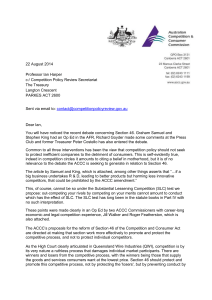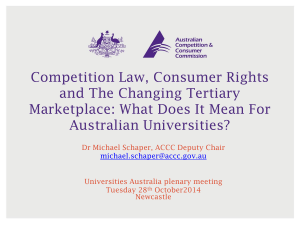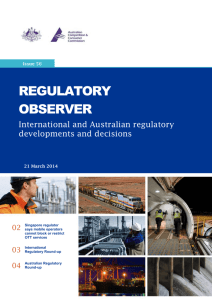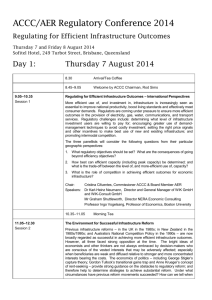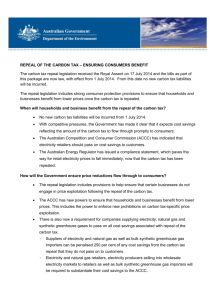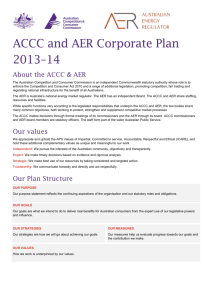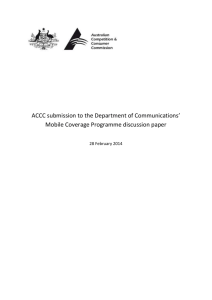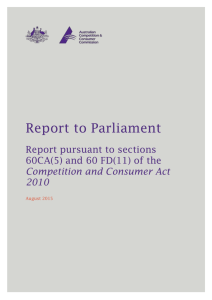PART IIIA - Australian Competition and Consumer Commission
advertisement
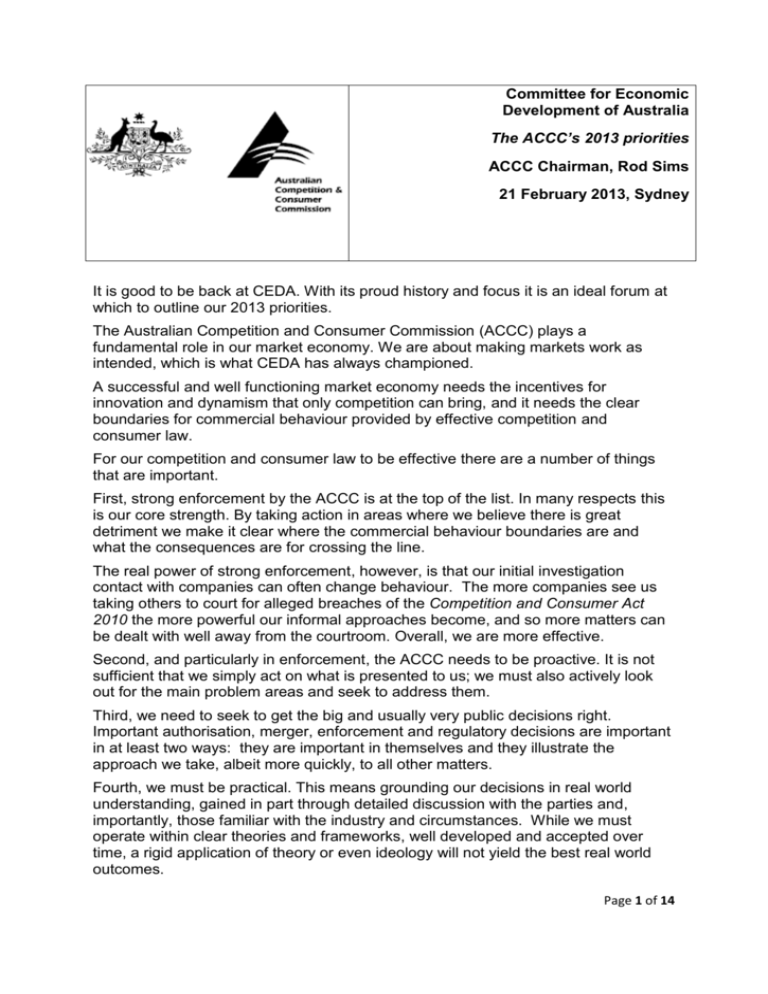
Committee for Economic Development of Australia The ACCC’s 2013 priorities ACCC Chairman, Rod Sims 21 February 2013, Sydney It is good to be back at CEDA. With its proud history and focus it is an ideal forum at which to outline our 2013 priorities. The Australian Competition and Consumer Commission (ACCC) plays a fundamental role in our market economy. We are about making markets work as intended, which is what CEDA has always championed. A successful and well functioning market economy needs the incentives for innovation and dynamism that only competition can bring, and it needs the clear boundaries for commercial behaviour provided by effective competition and consumer law. For our competition and consumer law to be effective there are a number of things that are important. First, strong enforcement by the ACCC is at the top of the list. In many respects this is our core strength. By taking action in areas where we believe there is great detriment we make it clear where the commercial behaviour boundaries are and what the consequences are for crossing the line. The real power of strong enforcement, however, is that our initial investigation contact with companies can often change behaviour. The more companies see us taking others to court for alleged breaches of the Competition and Consumer Act 2010 the more powerful our informal approaches become, and so more matters can be dealt with well away from the courtroom. Overall, we are more effective. Second, and particularly in enforcement, the ACCC needs to be proactive. It is not sufficient that we simply act on what is presented to us; we must also actively look out for the main problem areas and seek to address them. Third, we need to seek to get the big and usually very public decisions right. Important authorisation, merger, enforcement and regulatory decisions are important in at least two ways: they are important in themselves and they illustrate the approach we take, albeit more quickly, to all other matters. Fourth, we must be practical. This means grounding our decisions in real world understanding, gained in part through detailed discussion with the parties and, importantly, those familiar with the industry and circumstances. While we must operate within clear theories and frameworks, well developed and accepted over time, a rigid application of theory or even ideology will not yield the best real world outcomes. Page 1 of 14 Fifth, we must recognise that, while effective competition will clearly yield the best outcomes, we will always have monopolies that will need effective regulation. Left to their own incentives monopolies will pursue action that maximises their own profits and drives inefficient outcomes for society. It defies all the underpinnings of our market economy to assume otherwise. Finally, and crucially, the ACCC must explain what we are and are not doing, and why. This is fundamental to achieve strong compliance with the law, and so that people can have a better understanding of how and why our market economy works for them. Indeed, the vast majority of criticisms of ACCC lack of action, and there are a few, involve situations where the complaints concern behaviour that is not a breach of our Act. We need to explain this, which will also see us explaining what our Act is and is not seeking to do. In this sense there is a fine line between being an effective regulator and straying into policy. There is another element to our approach to communication. We aim to say what we will do, and then do what we say. This way, over time, we hope that companies will take our warnings on problematic behaviour more seriously. Consistent with this approach, today I am going to outline our 2013 priorities. We are, however, an organisation that cannot control all that we do, as merger assessment, authorisations and enforcement actions, for example, are often driven by what is presented to us. Before outlining our 2013 priorities, therefore, I cannot resist sharing with you the flurry of activity we had in the month or so before last Christmas. In that month, the Federal Court imposed penalties, by consent, totalling $1 million against Cotton On Kids Pty Ltd after it was found to have sold unsafe children’s nightwear. We started court proceedings against eleven Harvey Norman franchisees for allegedly misrepresenting consumer rights. We also took court action against DuluxGroup (Australia) Pty Limited relating to claims about the temperature reducing capabilities of some its paint products. We started court proceedings alleging that Yazaki Corporation, a Japanese company, and its Australian subsidiary, Australian Arrow Pty Ltd engaged in cartel conduct, and there were a number of rulings in relation to our air cargo cartel matter. On the mergers front we announced that the ACCC would oppose Carsales.com Limited proposed acquisition of Trading Post. We also put out a statement of issues calling for further comment on the proposed acquisition of Adam Internet Pty Ltd by Telstra Corporation Ltd and Woolworths Limited's proposed acquisition of Hawker Supa IGA. We held an important stakeholder conference to discuss and assess NBN’s Special Access Undertaking. To cap-off a busy quarter we released our draft decision in relation to the authorisation application for Qantas Airways Limited and Emirates to co-ordinate their operations. I will now outline our 2013 priorities under four headings: Page 2 of 14 First, and most important, I will launch our new edition of our Compliance and Enforcement Policy. This in many ways embodies our proactive approach. I will then, reasonably briefly, discuss our 2013 priorities and likely activity in relation to: - mergers and merger processes - regulation, and - small business. 1. 2013 COMPLIANCE & ENFORCEMENT PRIORITIES It was clear when I began at the ACCC some 18 months ago that the key to maximising our contribution was to identify the most important problems for consumers and competition, decide whether we are best placed to fix them and, if we are, to then focus our resources on delivering outcomes in those areas. We cannot pursue every matter that comes to our attention. Indeed, one of our key roles is to make choices and pick the right interventions. While it varies from year to year, as an illustration: We start with over 160,000 complaints and queries in the year We have a deeper look at over 3,000 of those We commence about 550 investigations Around 140 of these progress to in-depth investigations Resulting in 30 plus court proceedings, 30 plus court enforceable undertakings, and the payment of numerous infringement notices. Recognising the importance of this process, one of the first adjustments I set in place was to facilitate a strategic review aimed at identifying those areas we should focus on. Importantly, we undertook this exercise with transparency and published a revised Compliance and Enforcement Policy in February 2012 which set out our areas of focus and explained the factors we take into account when deciding whether or not to pursue particular matters. The first stock take of this approach late last year revealed that well over 50 per cent of our work sat within our priority areas and almost all matters we pursued were aligned with the factors we set out publicly for ACCC intervention. Today, I announce the results of the ACCC’s latest strategic review of its enforcement and compliance work undertaken in late 2012. The review involved a thorough assessment of information about consumer and competition issues gathered by the ACCC from a wide range of sources. These include: state and territory consumer and fair trading agencies, the various industry ombudsman services including energy ombudsman in the states and the TIO, Page 3 of 14 surveys of international agencies, information from consumer representative bodies including Choice, analysis of our own complaints information, and analysis of media reports on consumer or competition issues. While the review confirmed many of our previously identified priorities it added some new areas. We have named these priorities in the 2013 edition of the ACCC’s Compliance and Enforcement policy, which I release today. Competition Issues Our Compliance and Enforcement policy now emphasises that some forms of conduct are so detrimental to consumer welfare and the competitive process that the ACCC will always assess them as a priority, irrespective of the sector of the economy in which the activity occurs. These are: cartel conduct anti-competitive agreements, and misuse of market power. As a specific area of focus, the ACCC has maintained reference to placing priority on competition and consumer issues arising in highly concentrated sectors, and in particular the supermarkets and fuel sectors. We have also decided to place further emphasis on online competition and consumer issues. This includes conduct which may impede emerging competition between online traders or limit the ability of small businesses to effectively compete online. Late last year, and flowing from our strategic review process, I spoke to a number of news outlets making it clear that we expected to increase our rate of intervention in competition matters. Given their resource intensity we have recently reviewed our investigations to focus on the most important or problematic matters and we currently now have between 20 and 30 in depth investigations into anti-competitive conduct. These matters will mostly face significant hurdles arising from their complexity, the need to obtain evidence, and the need to meet the thresholds set by our legislation. Only a small minority of them will result in court proceedings, and the courts will not always agree with us that a breach of the Act has occurred. Our competition focus has already been demonstrated with this month’s announcement of the institution of proceedings against Visa Inc alleging that the operator of the world's largest retail electronic payments processing network misused its market power for the purposes of: preventing the expansion of Dynamic Currency Conversion (DCC) to new merchant outlets in Australia, such as retail stores, and preventing businesses in Australia from supplying DCC services on ATMs in competition with Visa’s own currency conversion service. Page 4 of 14 The ACCC is concerned that Visa sought to stop the growth of competing Dynamic Currency Conversion services and, as a result, limit the choices available to consumers. This was a big investigation and we expect it will be a significant court proceeding, being the first of its kind in the world. Turning to our 20 – 30 competition investigations, in the vast bulk of cases they will remain confidential. Sometimes, however, the behaviour in question gains so much attention that we would appear inept if we did not acknowledge that we were undertaking an investigation. In addition, continuing public interest and new developments also on occasion require us to comment. Last week I made a statement to the Senate Economics Committee about two investigations. I had made an earlier commitment to report the broad outcomes from the discussions we have had with the 50 or so suppliers to the major supermarket chains, particularly on whether what we had learned, if put to proof, could be a breach of our Act; and we have been constantly pressed to acknowledge the importance of the now longer and larger shopper docket discounts on fuel that are in essence funded from supermarket sales. We are well aware of the risks of making such statements. For example, expectations can be raised as to the end result of our investigations. Given that we have said, for example, that we will not use the results of the approximately 50 confidential discussions in any action, we have a long way to go, with much work required to obtain, analyse and assess the available evidence before we can draw firm conclusions concerning breaches of our Act. Cartels We have, of course, continued to prioritise our work against cartels, whether they involve price fixing, agreeing to restrict output, market sharing, or bid rigging. Since 2008, the Federal Court has awarded $126 million in six cartel matters. Of this, $98.5 million was in relation to an international air cargo cartel matter where proceedings have been settled against 13 airlines. We are seeking penalties against two further airlines: Air New Zealand Ltd and PT Garuda Indonesia Ltd, with the trial continuing in the Federal Court, Sydney. By many measures, this has been our biggest cartel investigation ever and sends a clear signal that we will continue investigations over the long haul to deter and punish conduct we believe to be illegal and harmful to competition and consumers. And it was only late last, as I have already indicated, year that we instituted our latest cartel proceeding in the Federal Court against Yazaki Corporation, a Japanese company, and its Australian subsidiary, Australian Arrow Pty Ltd. The ACCC alleges that Yazaki and Australian Arrow engaged in cartel conduct, market sharing and price fixing, in relation to the supply of wire harnesses to Toyota Motor Corporation and its related entities in Australia. Page 5 of 14 This follows proceedings started earlier in 2012 against Renegade Gas Pty Ltd (trading as Supagas NSW, a privately owned company) and Speed-E-Gas (NSW) Pty Ltd (a wholly owned subsidiary of Origin Energy Limited). The ACCC alleges that these companies gave effect to an anti-competitive cartel arrangement which included not supplying liquid petroleum gas (LPG) cylinders for forklifts to each others' customers. These customers were both small and large scale businesses. These actions sit within a broader set of activities the ACCC has invested in with a view to preventing and terminating cartel behaviour. In 2012, we produced a short film 'The Marker' which I sent to the chief executives of Australia’s top 300 companies. We have undertaken a suite of awareness activities and we have beefed up our behind the scenes pro-active cartel detection capabilities. We continue to invest in our cartel immunity policy which has just ticked over 100 approaches from those with an interest in being the first to disclose cartel conduct and cooperating with an ACCC investigation in return for immunity. And I am yet to mention criminal sanctions which have been available to the ACCC since July 2009. There can be no better disincentive for executives than the prospect of up to ten years in prison. Whether our first criminal cartel prosecution occurs in the short term or whether it occurs in the medium term, we have no doubt that the new offences are having the effect desired. In this regard, we are a patient regulator and we will not rush criminal investigations or be tempted to prosecute matters better suited to civil allegations. There should be no doubt however that we will pursue the right matter with vigour. Addressing consumer problems Our increased focus on competition matters will not in any way distract us from protecting consumers from false or misleading conduct, unconscionable behaviour and unsafe products. We have been greatly assisted over the last two years with the new Australian Consumer Law which has brought with it: new provisions to help tackle problematic conduct such as door to door practices of concern; new sanctions such as million dollar civil penalties and the flexibility of infringement notices that better provide the spectrum of deterrence required; and greater opportunities to work with state and territory agencies in our common interest in protecting consumers. Our consumer protection priorities as set out in our new Compliance and Enforcement Policy are a mix of those from 2012 that require further work and new and emerging concerns. They are: online consumer issues telecommunications and energy Page 6 of 14 consumer guarantees consumer protection issues impacting on Indigenous communities credence claims, particularly in the food industry unfair contract terms, and of course, our carbon price claims role continues. Online consumer issues We will continue to give priority to online competition and consumer issues including conduct which may impede emerging competition between online traders or limit the ability of small businesses to effectively compete online. For example, this year the work we have already commenced in looking closely at online group buying websites will come to a head. Despite recent inroads from the work of ACL regulators, during the past couple of years there has been a significant increase in complaints about these websites. Another new area of complaint that the ACCC is interested in is fake testimonials and reviews in online retailing, given the increasing number of consumers shopping online. Fake testimonials can mislead consumers and give an unfair advantage to unscrupulous traders. Telecommunications and Energy We continue to place priority on consumer protection in the telecommunications and energy sectors. Actions against Apple Pty Limited last year and the continuing proceedings with TPG Internet Pty Ltd are the type of interventions you can continue to expect from the ACCC. On the energy side, we continue to drive energy retailers to fix what has been, in our view, reprehensible treatment of consumers by many involved in door to door sales. Actions against two traders last year will be followed by more this year, with investigations continuing into a number of traders. And let me say that there was no ambush by the ACCC on this front. We had been warning for some time that industry needed to fix this problem, yet the complaints have continued. As I mentioned earlier, we said what we would do, and then we followed through. It is not all about enforcement, we also use education to address matters of concern. Last year, at the same time door to door investigations and proceedings were being progressed, the ACCC launched its ‘Knock! Knock! Who’s There?’ consumer awareness campaign. The focus was to stop unfair door to door sales practices and the put the word out to consumers about their rights and ability to refuse door to door sales. We have handed out close to 70,000 ‘Do Not Knock’ stickers, 39,000 door hangers and 16,000 consumers guides. Consumer Guarantees Page 7 of 14 We will continue to focus on the new consumer guarantees, though you will see some changes in our activities. Ensuring consumers and businesses alike have an awareness of consumer rights remains a key to ensuring these important provisions have the effect intended. In December last year, building on the work done by Consumer Affairs Victoria, the ACCC Shopper app was released. It is a consumer focused application which provides information on consumers’ rights and allows users to set reminders for their gift vouchers and lay-bys. The app has been downloaded more than 7000 times since release. Ensuring we act where we believe consumers may be misled is another way we can drive that awareness and adjust business behaviour. Late last year, proceedings were instituted against Hewlett-Packard Australia Pty Ltd in relation to a number of alleged misrepresentations about statutory warranties and consumer guarantee rights. Proceedings soon followed against a number of Harvey Norman franchisees in which we alleged those businesses engaged in misleading or deceptive conduct by making false or misleading representations to consumers about their rights under the consumer guarantee provisions. Consumer protection issues impacting on Indigenous communities Identifying and addressing consumer protection issues impacting on Indigenous communities continues to be a priority for the ACCC, and for that matter other ACL regulators who have worked closely with us on many fronts. For the ACCC’s part, it continues to take enforcement action whether it be related to selling phone plans in out of coverage areas or misrepresentations about art. Important in this process is continuing to develop relationships with Indigenous communities and consumers with a view to empowering them in their dealings with business and in providing confidence for matters to be reported and actioned. We have stepped up our activity on this front with increased outreach and projects with specific communities. Credence claims New to our priorities is an interest in credence claims, particularly those in the food industry with the potential to have a significant effect on consumers and the competitive process. Consumers are increasingly placing weight on premium claims made by producers that a consumer cannot test or validate. They are in the hands of the producer, leading to a particular vulnerability. We have already been working on these matters with actions in relation to a number of ‘free range’ claims, and we have tackled alleged misrepresentations in the labelling of extra virgin olive oil and taken on country (or region) of origin claims from sheepskins to meat. Broader compliance activities have sought to tackle the same problems by providing information to consumers on olive oil and country of origin through the shopper app. Page 8 of 14 Unfair contract terms I have already noted on the public record that this year we will be having a closer look at unfair contract terms. Progress in this area has already been made. We have reviewed consumer contracts in a number of sectors including: telecommunications airlines hire cars, and online trading. A number of businesses have already made amendments to their standard contracts after the ACCC approached them about potentially unfair terms. We will be issuing a report on the outcomes of those reviews shortly. We will make it very clear that more direct action can be expected from those that continue to use clauses of concern. Our first allegations of UCT will be heard in court shortly in the proceedings against the current operators of the Advanced Medical Institute Pty Ltd business. 2. MERGERS AND ACQUISITIONS As I have mentioned in other forums, the ACCC’s review in merger cases is focused on the likely effect of the transaction on competition 'based on commercially relevant facts, assessments and evidence and not speculative possibilities'. Importantly, the ACCC’s focus is on getting the decision right. This means that there will be some transactions that require close attention. It is important that merger parties and their advisers expect that when a merger is likely to raise serious competition concerns, the ACCC will carry out a full and detailed review of the proposed merger, gathering all of the necessary commercially relevant facts. This is particularly the case where large complex transactions also involve the negotiation of remedy undertakings. Foxtel / Austar United Communication Ltd and APA Group / Hastings Diversified Utilities Fund are good examples. Indeed, in the APA case, the offer of undertakings during the course of the review substantially transformed the transaction we were scrutinising, requiring us to undertake additional information gathering. However, the length of time our reviews take, and the potential impact on the parties’ commercial timeframes, is something we are acutely aware of and we are taking a number of steps to address. As part of this process, we are currently revising the Informal Merger Process Guidelines and will be consulting with key stakeholders on the revised draft in coming months. This will involve updating the guidelines to reflect process changes that have already become practice, and exploring new processes. Page 9 of 14 A key example of a past change has been the introduction of pre-assessments which has meant that we are dealing with a large proportion of the reviews very quickly. During 2011/12, 250 of the 340 matters considered were cleared without public review on the basis that the SLC risk was considered low; as a result, 87 percent of matters (pre-assessments and reviews) were completed in 8 weeks or less. In addition, the ACCC has responded to calls by the trade practices and business community for increased transparency from, and engagement with, the ACCC during the course of merger reviews. The ACCC welcomes this engagement and has continued to improve its processes in this area. It is important, however, to recognise that such measures have consequences for the length of the review. The ACCC has, for example, been informing the parties in writing of the issues raised in market enquiries, and on many occasions then awaiting a response, prior to making those issues public through the statement of issues (SOI) process. This means that merger parties are better informed and have had the opportunity to make submissions on these issues. This has resulted in fewer surprises at the SOI stage and ultimately in more rigorous and focused SOIs. The same level of engagement also occurs after the ACCC has considered the market response to the SOI. The ACCC will inform parties in writing of the competition concerns remaining following the post SOI market enquiries. This is a very important stage in the process and ensures that merger parties are as fully informed as possible about the remaining concerns of the ACCC following market enquiries. Importantly, it affords parties the opportunity to comment on all substantial competition concerns before the ACCC makes its decision. Equally importantly merger parties are again not taken by surprise if those issues are not resolved by the time the ACCC comes to make its decision. This increased level of transparency and engagement must, however, slow the process down. While the ACCC is looking to improve its processes, we also believe merger parties and their advisers should be doing likewise. Unnecessary delays are being caused by some merger parties failing to comply fully and in a timely way to voluntary and compulsory information requests. In our informal regime, with no upfront information requirements, information requests are an important part of the process and allow the ACCC to test the merger parties and third parties on the submissions provided. There will always be scope to refine the nature and extent of information requests, and we will continually seek to do this, but the ACCC cannot shy away from their use. Merger priorities We are currently assessing many mergers in many sectors, including communications and aviation. In terms of forthcoming priorities, the ACCC will continue to closely scrutinise acquisitions in concentrated markets. While there are a range of factors to take into account in assessing mergers under section 50, market concentration is a key factor. Page 10 of 14 Acquisitions in the supermarket, liquor and hardware sectors by the major supermarket chains, including new greenfield store developments, will continue to be a focus. Electricity generation is another area where I expect the ACCC’s attention will be drawn. In particular, the potential privatisation of generation assets in New South Wales, and possibly Queensland, is likely to require the ACCC to assess a range of possible transactions. In generation, we need to ensure that the market structure around the National Electricity Market (NEM) continues to encourage vigorous competition. I recently gave a speech in Mexico to ministers and the OECD where I emphasised the importance of getting the market structure right when privatising assets. With privatisation, the NSW and Queensland Government’s have a one-off opportunity to influence the long-term structure, and hence the level of competition. Get it wrong and the industry will suffer from the exercise of market power for many years to come, ultimately to the detriment of consumers. Get it right, and strong competition will drive prices to efficient levels. 3. REGULATION ISSUES This is not the occasion to go into regulatory issues in any detail. There are, however, four issues that will figure prominently in 2013. PART IIIA Much interest is being generated in regulatory circles this year by the Productivity Commission’s long-awaited inquiry into the National Access Regime. This was designed to promote competition in markets that need access to infrastructure which has natural monopoly characteristics, such as electricity and communication wires, pipelines, railways and ports. The genesis of the National Access Regime was an inquiry into National Competition Policy by a committee chaired by Professor Fred Hilmer. The key benefit of having an Australia-wide approach to access issues is that it promotes a consistent approach across the economy. The ACCC considers that the National Access Regime has been, and continues to be, successful. In our comprehensive submission to the Productivity Commission’s review we have drawn on our experience of regulation under the National Access Regime to outline what has worked well and what has worked less well. For example, in recent years the ACCC has witnessed increased competition and efficiency in wheat export trade and coal exports in the Hunter Valley, partly as a result of the effective regulation of relevant port and rail infrastructure. On the other hand, the ‘declaration process’, by which a service is made subject to the National Access Regime, has been less successful. It can be a costly, complex and time-consuming path to access. We expect the Productivity Commission will receive multiple opinions on how best to streamline the declaration process. NBN Page 11 of 14 This year will see a significant focus on establishing the regulatory framework that will apply to the National Broadband Network (NBN) via its Special Access Undertaking. The undertaking will shape the telecommunications industry for decades to come, as NBN Co proposes the undertaking operate until 2040. Submissions to the ACCC have highlighted some concerns with the proposals NBN Co has put forward, particularly around how prices will be adjusted over the life of the undertaking. The ACCC’s role is defined by the legislation. In particular, the undertaking must be in the long-term interests of end-users (LTIE). In practical terms this might mean, for example, that consumers will be able to get services of the quality they get today, for the price they pay today. To the extent that consumers pay more than today, it would be for services of a higher quality. The ACCC continues to engage heavily with both NBN Co and the broader industry over the proposed undertaking. We are aiming to make a draft decision by March. Electricity regulation Until recently, electricity reforms tended to focus on the wholesale market and establishment of a national grid network. However, a major emphasis of recent electricity reforms is to also ensure that the market delivers for electricity consumers. First, there has been the recent announcement of more resources for the AER to set up a Consumer Challenge Panel. This Panel, which will sit within the AER, aims to have consumers’ interests better represented in regulatory decision making. By operating as a ‘critical friend’ to the AER, this initiative also has the potential to add a fresh perspective and additional rigour to regulatory decision making. Second, there has been the announcement of a proposal to develop a national consumer advocacy body to provide a consumer voice for energy policy and regulatory development. I have argued for the establishment of a well resourced, national energy consumer advocacy body for some time. Many energy market issues are inherently technical and complex. A national energy consumer advocacy body with the capacity to participate in these complex debates is needed to balance these debates on many fronts. Wheat code In order to export bulk wheat, vertically-integrated operators of port terminal facilities are required to provide Part IIIA access undertakings to the ACCC. The undertakings are necessary to facilitate competition in the wheat export industry by ensuring that other exporters are able to access bulk grain port terminals operated by their vertically-integrated competitors. In approving the undertakings, the ACCC has been aware of the differing competitive constraints in different geographic regions of Australia. This has led to the capacity allocation systems in SA and WA (where auction systems are in place) being different to that in the eastern states (which use long term arrangements and/or a first-come, first-served system). Late last year, the Australian Government further progressed the deregulation of the wheat export market by amending the Wheat Export Marketing Act. From 1 October Page 12 of 14 2014, vertically integrated port operators will no longer need to submit undertakings that govern access to their port facilities. However, this is conditional upon the Minister approving a mandatory industry Code of Conduct governing port access and that Code subsequently being prescribed under the Competition and Consumer Act. The ACCC will ensure compliance with the mandatory Code and take appropriate enforcement action where necessary. It will be important that the Code facilitate appropriate access to wheat ports in order to allow the continuing benefits of competition for the industry. The ACCC is liaising with industry and government regarding the Code’s development and is involved as an observer in the Code Development Advisory Committee. 4. SMALL BUSINESS The last priority are I want to cover is small business. The ACCC continues to focus on anti-competitive and unconscionable conduct that seeks to exploit or unfairly constrains small businesses in the marketplace. This focus extends from our enforcement work in concentrated markets and on conduct in the online sector, as well as to conduct more widely by businesses seeking to exploit a superior bargaining position. I have already mentioned our investigations in relation to supermarket supplier issues, many involving smaller suppliers. Collective bargaining The imbalance of bargaining power is one of the key issues identified by small business generally. One option already provided by the Act to address the imbalance of bargaining power is collective bargaining. The ACCC will continue to facilitate collective bargaining by suppliers, including primary producers. Supermarket code A supermarket and grocery industry working group, including Coles, Woolworths, the Australian Food and Grocery Council and the National Farmers' Federation, is proposing an industry code to govern supply chain issues. As I have said, while our investigations in this area have some way to go before we can reach firm conclusions concerning any breaches of our Act, we have seen enough to realise there is merit in such a code. It is, however, important that any such code contains meaningful provisions and that these are enforceable under the Competition and Consumer Act, otherwise it will achieve no more than the current ineffective code it seeks to replace. The ACCC has been providing input to industry on the issues it has been identifying and the elements of effective codes. We have stressed the importance of the code containing clear actionable and auditable obligations to allow industry and the ACCC to know when traders have crossed the line. Franchising Code Review Page 13 of 14 On the subject of codes, the Government is currently reviewing the Franchising Code of Conduct, which is a mandatory industry code prescribed under the Act. The ACCC has considerable experience in enforcing this code against those who fail to deliver on its requirements as to information disclosure, dispute resolution and fair termination. The ACCC considers that for any legislative instrument to be effective, including a prescribed industry code of conduct, penalties should apply to contraventions that are sufficient to act as a deterrent. Despite the ACCC’s record of enforcement action for breaches of the Code, and its industry code audit program, the ACCC continues to receive many complaints from franchisees alleging that their franchisor have not complied with the Code, as well as complaints about businesses operating franchise systems under the guise of a licensing or distributorship arrangement in a deliberate attempt to bypass the Code. This experience suggests that the current remedies available for contraventions of the Franchising Code, including injunctive relief and compensation, are not sufficient to deter those franchisors failing their obligations. The ACCC is therefore seeking, amongst other things, pecuniary penalties to be made available as an additional remedy to improve its capacity to deter inappropriate conduct. CONCLUSION Ladies and gentlemen, today I've set out the ACCC's agenda for 2013. We have a clear set of priorities, and a busy agenda. I am sure, however, that our year will also be well occupied by many issues that we cannot yet foresee. Thank you for your time today. Page 14 of 14
